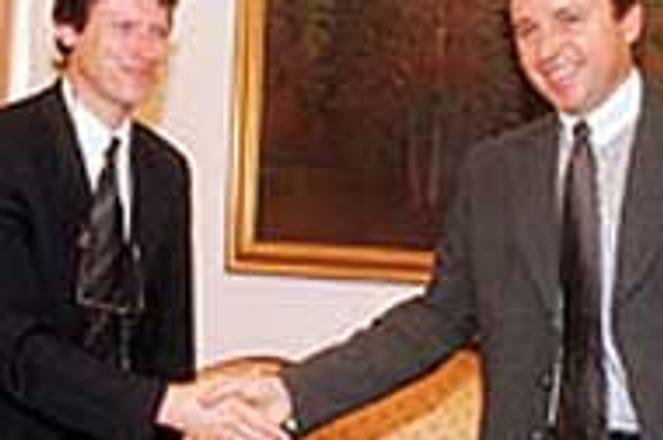Slovak Deputy PM Ivan Mikloš (right) met Czech Finance Minister Pavel Mertlík in Bratislava for a weekend meeting September 11-12.photo: TASR
PRAGUE: Six years after the split of former Czechoslovakia, the governments of the Czech and Slovak Republics took what appeared to be several major steps in early September in settling the debts that linger between the former federal partners.
Under the supervision of Slovak Deputy Prime Minister for Economy Ivan Mikloš and Czech Finance Minister Pavel Mertlík, a joint working group of Czech and Slovak economic specialists met for the last time on September 11 to clear the way for an agreement between the countries on the settlement of mutual debts.
"The working group has concluded its one-year tenure and prepared materials that summarize both countries' duties towards each other," Czech Finance Ministry spokesman Libor Vacek said.
"Now, it's up to the top political representatives of both states to make it [the clearing of the debts] happen," he added. He stressed that both sides would like to see the agreement signed by Presidents Rudolf Schuster and Václav Havel by the end of 1999.
One of the thorniest debt issues since 1993 has been the Czech demand that Slovakia return an estimated 34.8 billion Slovak crowns in assets left over from the liquidation of the former federal State Bank of Czechoslovakia. The Slovak side has never recognised the debt, prompting the Czech side to freeze five tonnes of Slovak gold held by the Czech National Bank.
Complicating the standoff has been the question of how to divide mutual stakes in former Czechsolovak state companies. Altogether, the National Property Funds of both countries own stakes in over 65 previously common state companies which are now scheduled for privatisation.
All that glitters...
Although neither the Czech nor the Slovak side would give specifics as to what was decided over the September 11-12 weekend, economic analysts guessed that both countries' desires to push ahead with privatisations of state companies had acted as a catalyst for agreement.
One of the hottest topics discussed at the meeting was a deal recently proposed by the Czech Finance Ministry. The deal offered a straight switch of bank shares, according to which the Czech Republic would pick up Slovakia's 13% stake in the Czech Komerční Banka (KB), in exchange for the Czech 66% stake in Všeobecná Úverová Banka (VÚB), Slovakia's largest bank. Both banks are slated to be privatised in the near future by their respective governments.
Since the Slovak stake in KB is worth around 1.2 billion Czech crowns ($35.29 million) more than the Czech shares in VÚB that Slovakia would receive in return, the Czech side offered to make up the difference by selling Slovakia 4.5 tonnes of gold from the Czech National Bank's reserves at a firesale price.
According to Czech National Bank spokesman Martin Švehla, the Slovak National Bank would be able to buy the gold at a wholesale price six times lower than its actual market value.
For the Czech side, such a deal would give the state a 51% stake in KB, considerably strengthening the Czech government's hand as it proceeds with the sale of the bank.
"It's always an advantage to control the majority stake in a bank before its sale," said Švehla.
"This step should be taken by the Slovak side as a noble gesture, and I hope it will lead to a quick conclusion," added Czech Deputy Foreign Minister Martin Palouč for the daily paper Mladá Fronta Dnes.
Vacek, however, declined to disclose the content of the September 11 negotiations, stressing that the governments of both countries would first have to approve the discussed materials before any information would be made public.
Slovak Finance Minister Brigita Schmögnerová was also tight-lipped about the chance for a quick breakthrough. "This issue has to be solved at a political level, meaning with negotiations between the prime ministers of both countries," she told a press conference in Bratislava.
The debt issue took a positive turn last December after years of stagnation when Slovak Prime Minister Mikuláš Dzurinda and Czech Prime Minister Miloš Zeman agreed to prepare a treaty that would outline a settlement of the countries' mutual obligations.
According to Czech government spokesman Libor Roušek, the treaty is expected to be ready for approval in time for an official visit by Dzurinda to the Czech Republic in early October.
But Palouč said he was skeptical that the treaty would be ready on time. "These negotiations are very sensitive and complicated. Even though I would appreciate a final conclusion to this problem being reached, I find the deadline for the signing the treaty during the coming visit of [Slovak] Prime Minister Dzurinda rather unrealistic," he said.

